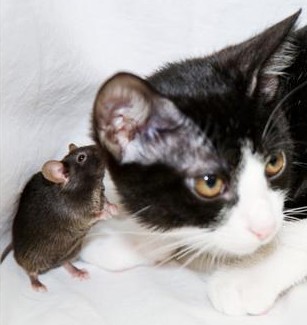|
CAT and mouse may never be the same.

The age-old animosity between cats and mice could be a thing of the past with genetically modified mice that Japanese scientists say show no fear of felines, a development that may shed new light on mammal behavior and the nature of fear itself.
Scientists at Tokyo University say they have used genetic engineering to successfully switch off a mouse's instinct to cower at the smell or presence of cats, showing that fear is genetically hardwired and not learned through experience, as commonly believed.
"Mice are naturally terrified of cats, and usually panic or flee at the smell of one. But mice with certain nasal cells removed through genetic engineering didn't display any fear," said research team leader Ko Kobayakawa.
In his experiment, the genetically altered mice approached cats, even snuggled up to them and played with them.
Of course, that's not necessarily good for a mouse's health. Kobayakawa said he chose domesticated cats that were docile and thus less likely to do what a cat normally would be expected to do when presented with a friendly mouse, pounce.
The mutant mice showed other changes as well.
According to a university press release on the findings, which were published in the science journal Nature, they stopped avoiding spoiled food, another sign that their fear response had been diminished.
To determine fear levels, Kobayakawa's team measured the stress-invoked activity in the brains of the mice, which produces certain hormones in the blood, and found it to be lower than expected.
Separate tests showed that mutant mice could still be taught to fear cats by exposing them to a feline odor and then inflicting pain, according to the release.
"The discovery that fear is genetically determined and not learned after birth is very interesting, and goes against what was previously thought," he said.
The research may have practical applications in the future.
Kobayakawa said his findings, published in Nature last month, suggest human aversion to dangerous smells like that of rotten food could also be genetically predetermined. He said the research could be used to develop treatment for fear-related neural diseases, such as anxiety disorders, phobias, obsessive-compulsive disorder and other fear-related diseases.
Kobayakawa said he hoped to study reactions associated with positive smells as well, such as the odor of good food.
"There are many actions that smell can trigger. I'd like to get to the bottom of what determines those actions," he said.
Fearless humans aren't on the horizon.
Kobayakawa noted that mice have poor eyesight and are much more dependent on smell than human beings. The experiment did not measure the changes in sight-induced or sound-induced fear.
But Kim Dae-soo, a neural genetics professor at the Korea Advanced Institute of Science and Technology in Seoul, who was not involved in the research, said Kobayakawa's research could explain further what fear is, and how to control it.
"People have thought mice are fearful of cats because cats prey on them, but that's not the case. The study means mice are destined to fear cats," Kim said. "If we follow the pathway of related signals in brain, I think we could discover what kind of networks in the brain are important for controlling fear.
http://www.shanghaidaily.com/sp/article/2007/200712/20071213/article_341538.htm
|














